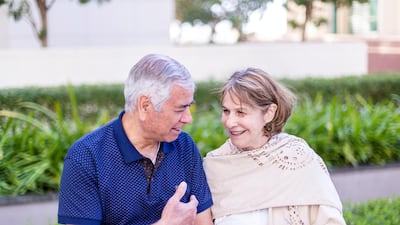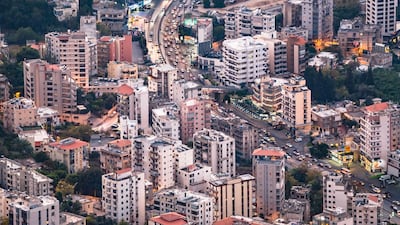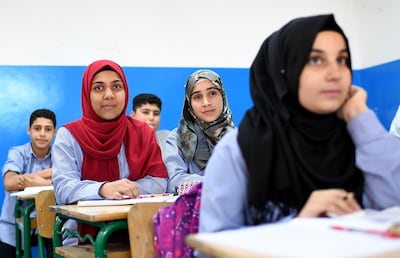When Sonia*, 60, got married to Rabih*, 61, three decades ago, the last thing on her mind was her husband's country of origin. Together, they had gone through the hardships of Lebanon's civil war, but they were in love and determined to make the most of their lives. She did not care that she was Lebanese and he was Palestinian.
But, after having two daughters, Zeinab* and Samira*, everything changed for the couple – and their nationalities became more important than ever. It even left them feeling as if they had to stop Zeinab, now 28, from becoming an engineer. "We could not let her chase her dream career, not because we couldn't afford her education, but because we knew that all the doors would be shut for her," Sonia explains. "After all, my daughter is Palestinian."
The truth about Lebanon’s nationality law
Like many children born to a Lebanese mother and a foreign father, Zeinab and Samira do not have Lebanese citizenship, which means they do not have the same rights in the country as passport holders. Lebanon's French-Mandate-era nationality law dates back to 1925 and has only been changed once, in the 1960s, to allow women married to foreigners to keep their citizenship, as it was previously stripped from them. The current law bars women from passing on citizenship to their children and husband, if he is not Lebanese. Meanwhile, men can grant full citizenship to their foreign spouses after one year of marriage and their children are automatically considered Lebanese.
There is a consensus among the political class, which represents Lebanon's different sects, that if women were able to pass on their nationality to their children and husbands, Lebanon's delicate sectarian balance would tip in favour of Sunnis, one of the country's three major communities, alongside Shiites and Christians.
For Sonia, this means that her children, who were born and raised in the northern city of Tripoli, are considered foreigners in Lebanon, despite their lineage. An added layer of concern for the family is the fact Palestinian residents of Lebanon are given restricted access to jobs by law. They are not allowed to enter 39 professions, which includes employment in public institutions, being a doctor, a lawyer or an engineer. They also cannot own property and when parents die, their possessions cannot be transferred to their children.
A bigger issue for Palestinians
Lebanon is home to about 450,000 Palestinian refugees, according to the UN Relief and Works Agency, with many of them having fled to the country after the formation of Israel in 1948. Lebanon has defended the laws restricting Palestinian rights as part of the state's policy to oppose their resettlement in the country, claiming that integrating Palestinians into Lebanese society will undermine their cause and discourage them from returning to their homeland.
In 1990, the Lebanese Constitution was amended to make sure "there will be no … settlement of non-Lebanese in Lebanon". Palestinians made up the overwhelming majority of refugees in the country at the time. To this day, all the major political parties, even outspoken defenders of the Palestinian cause such as Hezbollah Secretary General Hassan Nasrallah, agree on the issue of non-resettlement unanimously. In a TV appearance in May, Nasrallah referred to naturalisation as a "danger" and a "threat". This idea was echoed in a tweet last year by Lebanon's former Foreign Minister Gebran Bassil, who said opposing the naturalisation of Syrians and Palestinians in Lebanon was necessary to "defend the existence of Lebanon and to defend the rights of the Palestinian and Syrian people" against a set of "conspiracies aimed at moving from their home countries and resettling them in a land that is not theirs".
Instead of being supportive, however, Sonia says these limitations have left Palestinians living in Lebanon struggling to make ends meet.
After completing her studies, Samira, 31, taught maths at a Tripolitan school for a few months. Despite having a degree, she was only paid 500,000 Lebanese pounds (Dh1,220) per month, less than half the minimum wage for a teacher, according to the Lebanese Teachers Syndicate. This wasn't even really a salary, because, to avoid paying the legal fees necessary for hiring foreign employees, the school hired Samira without a contract. But even if she had been hired legitimately, she, like any foreign worker in Lebanon, would not have had access to basic rights such as social security, health insurance or a pension, despite having to pay for these services through tax.
A study about Palestinian employment in Lebanon, a project funded by the EU, showed half of Palestinian refugees living in the country earn 500,000 Lebanese pounds per month or less. That is below the national minimum wage of 675,000 Lebanese pounds per month and 20 per cent less than the average monthly income of Lebanese workers, according to the International Labour Organisation, which produced the study. These kinds of limitations have pushed many people in Samira's position to work illegally. With an estimated 1.5 million Syrians seeking refuge in Lebanon since the outbreak of the civil war in 2011, according to the UN refugee agency, regulations have become increasingly strict regarding foreign workers. This includes people born to Lebanese mothers.
Added concern for Syrians
Nayla, 49, says the current environment has deeply affected her Lebanese-Syrian family. "My husband was born and raised in Lebanon, but because he is a Syrian national, my children need residency permits to stay by our side in Beirut. I have to renew the permits every three years."
This has also gotten in the way of her children's education. "When my children wanted to pass their brevet and baccalaureate [the Lebanese national exams] we had to go back to Syria to sort out their paperwork before they could sit the exams," she says. This was despite the fact her children have never lived there.
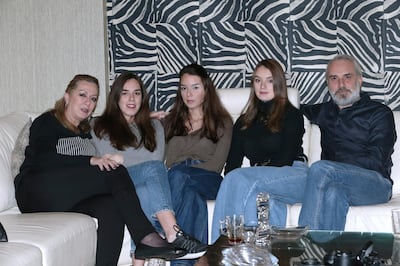
Schools in Lebanon are required by law to prioritise the enrolment of Lebanese pupils over foreign students and, as the number of non-citizens has increased since the conflict in Syria, some schools have severely limited registrations for non-Lebanese. "Because of this, Lebanese mothers were unable to register their children in school," says Karima Chebbo, the director of My Nationality is a Right for Me and My Family, a movement fighting for equal rights for women in Lebanon.
In August, she participated in a campaign to secure a decree designed to protect these children against discrimination when registering at a school, stating they should be treated the same as Lebanese pupils.
Nayla says the situation has taken a turn for the worse since the start of the Syrian war. "My children did not suffer an awful lot from the growing racism, as they are very fair-skinned and do not have a Syrian accent," she says. "But even so, the discrimination is starting to get to them. They know they are not being treated as equals."
This discrimination also comes from the top. Bassil, who is the son-in-law of Lebanese President Michel Aoun and the leader of the Free Patriotic Movement, the country's most popular Christian party, has been riding a wave of anti-Syrian sentiment for the past few years. In a 2018 interview with The National, he refused to describe Syrians as refugees, referring to them instead as "migrants" and "displaced people". Meanwhile, Aoun has repeatedly called for their return to Syria, even though the civil war has yet to end.
This might be why Nayla's two eldest daughters Sally, 25, and Nour, 24, graduated with engineering degrees from the American University of Beirut, one of the country's top universities, and yet have remained unemployed for more than 18 months. Unemployment is also a problem for Lebanese citizens, as 20 per cent of the population is currently looking for a job, but the numbers are even higher for Syrians living in the country, reaching 30 to 35 per cent, according to a report by Blom Bank.
Nayla says the company Sally works for pays her a salary one month out of every three and both of her eldest daughters have been forced to work illegally. "If my children had the opportunity to work abroad, I would be thrilled," Nayla says. "I do not want them to stay here in these conditions any more.
"I was born here. My husband was born here. My children were born and raised in Lebanon. And yet, my country cannot grant me this basic right."
Inspiring an exodus
For generations, hardship has pushed many people to leave the country. Zakieh's story is testament to this exodus. Now 70, she met her Palestinian-Jordanian husband, Bassam, also 70, while studying at university in Beirut. They got married in 1974, a year before the civil war erupted in Lebanon. The newlyweds then fled to Kuwait. "We were able to live a normal life in the Gulf, but each time I wanted to visit Lebanon I had to get visas for my children," she says. "This was a difficult process, as these were times of war."
In 1990, Zakieh and her family were forced to leave their home again, after Iraq's invasion of Kuwait. "We chose to leave for Amman, not Beirut, because the situation was not stable in Lebanon and because I knew my children had no future in my home country," she says.
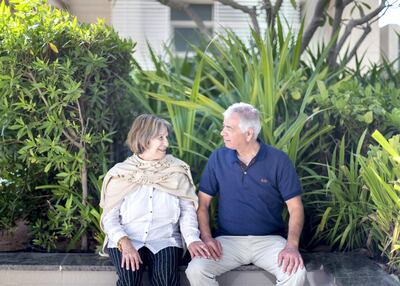
Had her children been granted Lebanese citizenship, she says she would have preferred to go back to her home country, despite the economic problems and political instability there.
“When you live in a foreign land, you always remain a foreigner,” she says. “When you are in your own country, you feel at peace. It would have definitely been better if I were at least given the choice to grant my children Lebanese citizenship. Now, I feel lost between the many places I’ve lived in.”
Today, leaving home remains the last resort for many who have been denied citizenship, including Sonia's daughters. "My daughters did not wish to stay in Lebanon," she says. "They got married to people living abroad."
For Ghida, 28, a Lebanese resident of Dubai who recently got married to Saif, 31, from Jordan, it is clear the current law in her homeland must be amended to give women full equality, including the right to pass their nationality to their spouses. Otherwise, she says, those who are affected by the law will continue to be pushed out of the country by circumstance.
“It’s not just about the children, but about our husbands, too,” Ghida explains. “The current law makes your life harder as an emigrant, because if you marry a non-Lebanese you automatically cannot go back to Lebanon. Your children will not have citizenship and it will be impossible for your husband to find a job.”
Will the law change?
In June last year, lawmakers passed an expedited draft law to allow the children of Lebanese mothers to work without having to apply for job permits. Aoun sent the draft law back to legislators for consideration. It was expected to make the lives of those affected easier.
Over the past year, several proposals have been brought forth to change the nationality law, but none were approved by Parliament. The most recent attempt to reform women's rights was submitted by the National Commission for Lebanese Women in May.
It proposed allowing children with Lebanese mothers to receive citizenship, while adults would receive a "green card" that would enable them to apply for citizenship after five years. The draft law is supposed to be discussed in parliament in March, along with other proposals related to women's rights, but many people believe it falls short of providing equal rights to all children of Lebanese parents.
"This proposal is shameful," Sonia says. "We are talking about people who were born, raised and some even buried in this land. Yet they are not allowed to call themselves Lebanese."
Civil rights activists have also been sceptical of the draft law. Chebbo says that if this law is adopted, it will lead to discrimination between residents who are over the age of 18 and have green cards, and those under 18 who would be considered Lebanese.
"This law could create discrimination within the same family, with young children being considered Lebanese and their older siblings having another nationality," she says. "This does not make any sense – we're talking about people who have the same parents and live under the same roof."
The crux of the issue
The political consensus in Lebanon is that granting women nationality rights would disrupt the country's fragile sectarian balance. Lebanon is home to 18 sects, with Christians, Sunnis and Shiites each accounting for about a third of the population, according to CIA data. These estimates exclude Palestinians and Syrian residents, who are overwhelmingly Sunni.
Such concerns prompted Bassil to propose a law in 2018 to allow women to pass on their nationality to their offspring, but only if their spouses were not from neighbouring Arab countries. The proposal did not pass.
There is no official data on the number of Lebanese women married to foreigners, but a 2009 UN Development Programme-backed study found that, between 1995 and 2008, there were only 18,000 marriages between Lebanese women and foreign men in the country. This represents less than 1 per cent of the population.
“When we are discussing basic rights, one’s sect should not matter,” Chebbo says firmly. “Women and men should be granted equal rights regardless of their religious affiliation.”
For her, the reason the law has not beenchanged in nearly a century has nothing to do with religion and everything to do with sexism and politicking. "This is the result of a patriarchal society that believes that women should not have any say in their destiny," she says. "The law essentially treats women as guests in their own country and not as citizens." She also points out that concerns for the country's sectarian make-up have not stopped the state from carrying out mass naturalisations in the past.
Yet this is exactly why Raymond, a painter living in Batroun, is wary of naturalising foreigners married to Lebanese women. "In principle, I think women should have the same rights as men with regards to citizenship," he says. But he does not trust the Lebanese state to introduce new nationality laws fairly and without sectarian politicking in mind, he says.
"What if [Hezbollah leader] Nasrallah decides to order his women followers to only marry Iranians? Thousands of Iranian nationals will essentially become Lebanese." He says such a demographic change would tip the balance in one community's favour. "Christians are afraid that they will become a negligible minority if Palestinians and Syrians are naturalised," he says. "Shiites, of course, are opposed to this idea for the same reason. Even Sunnis are against it." He says the state can barely provide for the impoverished Sunni populations of Lebanon's north as it is.
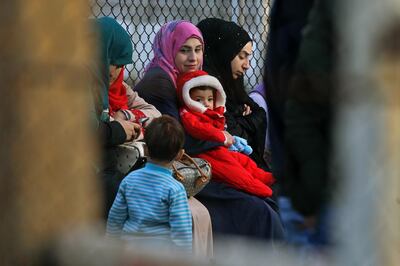
"There is always an 'if'," Nayla says. "If Palestinians had a state, they say women would have been able to pass on nationality. If equality did not disrupt the sectarian balance of the country, then they would have given us our rights." But this has not kept authorities from granting citizenship to spouses of Lebanese men and their children, she adds.
"I followed my heart and I do not regret marrying a non-Lebanese," she says. "One day my children will get their rights. I am sure of that."
*Some names have been changed to protect privacy
